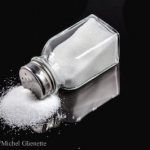The "Meatless Monday" campaign is an initiative launched in 2003 by the Johns Hopkins Bloomberg School of Public Health that encourages consumers to prepare meatless meals one day a week. You may have seen its mention on food websites. Sounds good, right? The USDA thought so too. For a few days last week. The campaign was started after studies showed going meatless one day a week may reduce the risk of developing cancer, heart disease, diabetes, and obesity. A statement on the Meatless Monday website states that "the United Nations' Food and Agriculture Organization estimates that the meat industry generates nearly one-fifth of the man-made greenhouse gas emissions that are accelerating climate change worldwide." Water usage for meat production is also huge, including an estimated … [Read more...]
Consumer Groups Ask For Surgeon General Report on Sugary Drinks
Experts are concerned that these beverages are increasing the obesity rate in children. In fact, one study found that "each extra soft drink consumed per day was associated with a 60 percent increased risk of overweight in children." In addition, "alarmingly, type 2 diabetes, which used to occur primarily in middle-aged and older adults, is now becoming more common among teens, especially those who are low-income and minority." The letter states that sugary drinks are now a routine daily beverage of choice for Americans, instead of an occasional treat. Pop and colas are promoted as a key to happiness and fun in aggressive marketing campaigns. The Institute of Medicine issued a report in May 2012 called Accelerating Progress in Obesity Prevention that recommended adopting policies to … [Read more...]
Dieting? Artificial Sweeteners May Not Be the Answer
Two studies presented at the June 2012 America Diabetes Association meeting showed that drinking diet pop is associated with weight gain in humans, and with higher blood glucose levels in mice. Epidemiologists at the School of Medicine at the University of Texas San Antonio looked at the relationship between diet pop consumption and waist circumference. They studied 474 patients over 10 years in the San Antonio Longitudinal Study of Aging (SALSA), which includes elderly Mexican-Americans and European-Americans. The results of the study were adjusted for diabetes status, physical activity level, neighborhood, age, smoking status, sex, ethnicity, and education. Researchers found that diet soft drink users had a 70% greater increases in waist circumference compared with those who did … [Read more...]
Popeye Was Right: Eat Your Greens
If you're over a certain age, you are very familiar with the Popeye cartoons. The hapless sailor could achieve superhuman levels of strength (and save Olive Oyl) after eating spinach. A new study published in The Journal of Physiology finds that leafy greens, which contain nitrate, do help you develop stronger muscles. The researchers found that nitrate, eaten in quantities easily accessible in a normal diet, improves muscle strength. Nitrate occurs naturally in leafy greens and vegetables, such as spinach, beet greens, lettuce, and chard. It's also found in beetroot juice. The amount given to mice in the study is equivalent to 200 to 300 grams of fresh spinach every day, or eating two to three beets. To put that amount into perspective, one cup of packed fresh baby spinach leaves … [Read more...]
White House Threatens Veto of House Bill Cutting FDA Funding
The White House Office of Management and Budget issued a Statement of Administration Policy on June 24, 2012 that objects to H.R. 5973. The Obama administration is threatening a veto of the bill if it is sent to the White House. The bill will set funding for Agriculture, Rural Development, Food and Drug Administration, and Related Agencies programs for the fiscal year ending September 30, 2013. According to the statement, the bill "imposes harmful cuts in rural economic development, renewable energy development, nutrition programs, food safety, and international food aid. Investing in these areas is critical to the Nation's economic growth, security, and global competitiveness. The Administration also strongly objects to the inclusion of any ideological and political provisions that … [Read more...]
Senate Passes 2012 Farm Bill
The United States Senate passed the Farm Bill on Thursday, June 21, 2012 by a vote of 64 to 35. This legislation will direct the country's nutrition and agriculture policy for the next five years. The bill now goes to the U.S. House of Representatives. Many amendments were attached to the bill, as we reported on earlier this month. This is what happened to the amendments relating to food safety and nutrition: The pulse crop project, proposed by Sen. Maria Cantwell (D-WA) passed. It would encourage the purchase of legumes for school meals. Amendment #2238 by Sen. Robert Casey (D-PA), which would require more frequent dairy reporting, passed. The amendment proposed by Sen. Kirsten Gillibrand (D-NY) to strike the reduction in the food stamp program and increase funding for the … [Read more...]
Artificial and Natural Trans Fats: They Are Different
By now, almost everyone has heard about trans fats and how unhealthy they are. In fact, studies have shown that trans fat consumption causes at least 30,000 deaths in the United States every year. The government has not set an upper limit on trans fat consumption because there is no safe intake amount. But there are two kinds of trans fat: natural and artificial. Natural trans fats occur naturally in dairy products and meat, made by a enzymatic process in the guts of ruminant animals. Artificial trans fats are man-made by bubbling hydrogen through polyunsaturated oils, making it a solid. And scientists think that natural trans fats are good for you. A study published in the March 2008 volume of American Journal of Clinical Nutrition, called the TRANSFACT study, found that in women, … [Read more...]
Chronic High Sodium Diet Associated with Hypertension
New research published in the America Heart Association's journal Circulation has found that in people who do not have high blood pressure (hypertension), a chronic high sodium diet is associated with the development of that disease. Researchers thought that a high sodium diet, over time, would cause damage to blood vessels in the endothelial layer. The study followed the sodium intake of 5,556 men and women in a city in the Netherlands as part of the PREVEND (Prevention of REnal and Vascular ENd stage Disease) study. They found that a diet sodium diet was associated with increases in two biomarkers that indicate endothelial dysfunction: serum uric acid (SUA) and urine albumin excretion (UAE). The endothelium in blood vessels is the thin layer of cells that line the interior surface. … [Read more...]
New Group will Rate Congress with a Food Policy Scorecard
A new group will rate Congress with a food policy scorecard, according to the Environmental Working Group. The new group, a 501c(4) nonprofit organization, will consist of food and agriculture policy leaders. This will be the first time an organization has rated politicians on their votes and stance on issues such as food safety, farm subsidies, farm animal welfare, organic and local food, nutrition assistance, fisheries management, and farm and food worker justice. The new group will issue the scorecard in the fall of 2012. It will be based on floor votes during the 112th Congress, as well as amendments proposed to the Agriculture Reform, Food, and Jobs Act, otherwise known as the 2012 Farm Bill. That bill is currently being amended and discussed in the United States Senate. EWG … [Read more...]
Food Related Amendments to the 2012 Farm Bill
The U.S. Senate voted last week to proceed with S. 3240, the Agriculture Reform, Food, and Jobs Act. Now Senators have submitted more than 80 amendments to the 2012 Farm Bill, as it is commonly known. Among those are amendments that would have an effect on food safety and nutrition. These are the notable amendments: Senator Maria Cantwell (D-WA) would like to encourage the purchase of pulse crop products for school meals. Pulses are legumes, such as chickpeas, lentils, and black-eyed peas. The amendments by Sen. Robert Casey (D-PA) include requiring more frequent dairy reporting and authorizing small operating loans for producers and farmers markets. Senator Kirsten Gillibrand (D-NY) wants to strike the reduction in the food stamp program and increase funding for the fresh … [Read more...]











